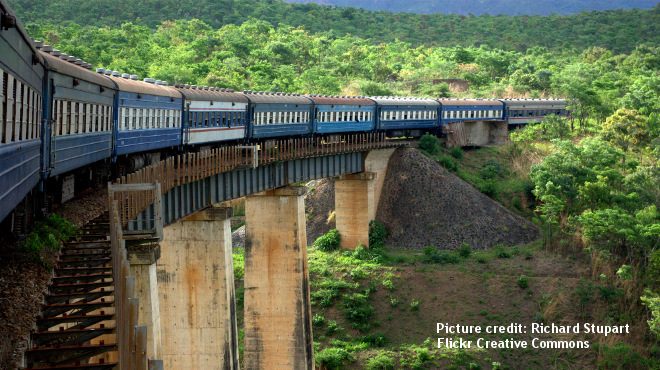More than just for profit: Sino-Japanese interests clash in Africa

The Chinese constructed Tazara railway running between Tanzania and Zambia
Recent years have seen an increase in Japanese activity in Africa, something which has not gone unnoticed by China, a long-time player on the continent. Competition, largely in East and Sub-Saharan Africa, takes the form of winning infrastructure and development projects. However, such projects are far from simply economic, and the outcome of developments in Africa have had geopolitical and security ramifications as far away as the East China Sea.
More Engagement
As a means of boosting its economy, the June 2013 ‘Japan Revitalization Strategy’ set about turning Japan into a major infrastructure exporter. The 2015 launching of the Japan Partnerships for Quality Infrastructure program was established for just this purpose, and since then a variety of African countries have signed infrastructure agreements with Japan.
The sixth Tokyo International Conference on African Development in Nairobi (TICAD VI) in August 2016 saw the conclusion of infrastructure deals with Kenya, Tanzania, Ethiopia, and Mozambique. The conference also launched the Japan-Africa Public and Private Economic Forum, and PM Abe pledged $30bn in private and public sector investments over a three year period. Like its Chinese counterpart, the Forum on China-Africa Cooperation (FOCAC), TICAD will now meet every three years (as opposed to five) and will alternate between Japan and Africa.
At the July 2017 African Union Summit in Addis Ababa, the African Development Bank and the Government of Japan signed the Japan-Africa Energy Initiative where Japan agreed to provide $6bn for energy projects. Later that same month, the Japan-Africa Business Forum met to promote trade and mutual investment. This is all indicative of growing Japanese interest in engagement with Africa.
Competition with China
China has long been heavily invested in Africa, funding the construction of transport links, stadiums, schools, and hospitals. Such projects are often completed ahead of schedule, however, China is widely perceived as prioritizing business transactions and profits over quality. Its products are often criticized as lacking in quality with ‘slapdash’ construction measures being employed. For example, Addis Ababa’s recently-built Light Rapid Transit network, and the Chinese road project in Kenya, where only Chinese companies were assigned, and labor and raw materials were imported.
Japan, while unable to compete in sheer amount of investment, manages to compete by emphasizing a reputation for high-quality work and contributions to the local economy. For instance, in 2008 Japan funded a road-construction project in Kenya, and while it took longer to construct, it was highly praised for its quality, taking local considerations into account, and employing local construction companies.
In Zambia, Chinese businesses have been accused of eliminating local traders via price competition, and Special Economic Zones have been criticized for bringing in foreign workers, contributing little to the local economy. In 2011, Human Rights Watch released a report detailing abuses of Zambian miners by their Chinese bosses. In contrast, Abe’s speech at TICAD VI emphasized that Japanese companies have a ‘manufacturing philosophy that holds each individual worker in high esteem’, an implicit contrast to Chinese practices. Though Chinese investment in Zambia continues to be high, Zambia recently signed deals with Japan to upgrade medical facilities. In the past, Japan has assisted in infrastructure, health, education, capacity building, rural industrial development, and private sector development.
Geopolitical Interests
Geopolitical goals are intertwined with economic competition. China, unhappy with a growing Japanese presence in Africa, has accused it of ‘attempting to impose its will on African countries to gain selfish interests and drive a wedge between China and African countries’. However, the same type of accusations have been made against China.
In 1970, China funded the construction of the Tazara railway from Dar es-Salaam to Kapiri Mposhi, providing a lifeline for landlocked Zambia. The project reaped geopolitical rewards when, a year on, China won the support of Zambia and Tanzania in its successful bid for a seat on the United Nations Security Council (UNSC). Today, both Japan and the African Union want representation at the UNSC, and at TICAD VI Abe emphasized UNSC reform as ‘truly a goal that Japan and Africa hold in common’. He offered ‘complete support’ to the African Union’s Agenda 2063 which aims to ‘correct the historical injustice of Africa not being represented on the Council by [giving it] a permanent seat’. Through involvement in infrastructure and development projects in Africa, Japan is building friendships which may aid its geopolitical objectives.
Recently, China secured the support of many African countries to publicly dispute an international arbitration tribunal ruling that the Spratly Islands rightfully belong to the Philippines. Thus, it should come as no surprise that Japan also seeks support for its stance on territorial disputes much of which are set against China. The TICAD VI Nairobi Declaration stressed the maintenance of a ‘rules-based maritime order in accordance with…international law’ and emphasized that the Pacific and Indian Oceans remain ‘free from force or coercion’, implicitly supporting Japan’s position on the Senkaku/Diaoyu dispute.
Japanese engagement with Africa, shows that the dynamic on the continent is changing. With talk of UN reform circulating, Japanese engagement in Africa may well pay dividends further down the road.